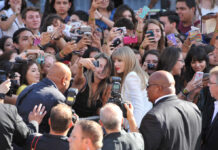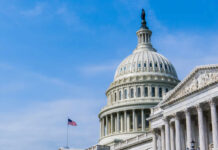
The use of face masks in public was mandated by governments around the world during the COVID-19 pandemic, but such rules have long been relaxed or removed entirely in most countries as the virus has subsided.
One notable exception is Japan, where a large portion of citizens had become accustomed to wearing masks before the pandemic to ward off seasonal illnesses such as the flu. COVID-19 made the practice even more common and, although masking requirements were scaled back in March, many Japanese citizens continue to don the facial coverings today.
A poll conducted last month found that more than half of all respondents said their mask use was at the same level that it was before the rules were relaxed.
Among many of those who have decided to shed their masks, there has been an adjustment period that in some cases involved relearning the act of smiling.
Students practice smiling at a smile training course at Sokei Art School in Tokyo, #Japan. Japanese get trained in 'Hollywood' smiles as masks slowly come off. pic.twitter.com/r0Jzzg514R
— China Daily (@ChinaDaily) June 5, 2023
One educator, former radio host Keiko Kawano, established a service called “Smile Education” and stated that demand for her lessons has quadrupled over the course of just one year. She noted that many students report having forgotten how to use their facial muscles to produce a natural smile since they have spent so much of the past three years with their faces obscured by a mask.
Her students include individuals from all walks of life and learn a proprietary curriculum she calls the “Hollywood Style Smiling Technique.” The business model is so popular these days that Kawano is staying busy with her own clients despite having trained nearly two dozen other coaches to provide similar instruction. One-on-one lessons cost roughly the equivalent of $55 per hour.
Himawari Yoshida, a 20-year-old student, endorsed the concept, explaining: “I hadn’t used my facial muscles much during COVID so it’s good exercise.”
Smiles are not the only facial cues that have been at least partially muted due to the widespread use of face masks in recent years.
University of Wisconsin-Madison psychology professor Paula Niedenthal explained: “We studied surprise, anger, disgust, and the reward smile in some of our first studies, and we found that disgust and smiling were most impaired using a mask and that surprise and anger were well conveyed.”
















